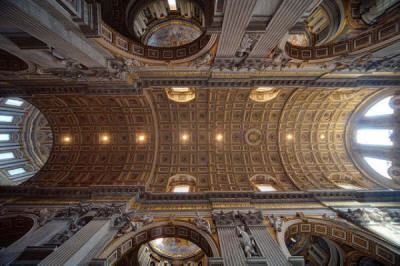|
by Deniza Gertsberg
January 14, 2011
via Wikimedia Commons In the past decade, a lot of ink has been spilled trying to discern the papal stance on GMOs.
While in 2000, the Pontifical Academy of Sciences gave its preliminary approval, and more recently, some of its vocal members have openly endorsed GMOs, the Holy See, in its public communiqués, always went the way of Switzerland. But there were always rumors and those who suspected otherwise.
The truth has seeped out, however, in recently leaked confidential WikiLeaks cables, and as a result, Vatican’s precarious neutrality has been shattered.
The cable revealed that Vatican was not concerned about the safety, science and the legitimacy of biotechnology and that, in fact, the mainstream opinion in the Vatican was that the GMO science was “solid.”
The Vatican did have an issue with the economic impact of GMOs on farmers.
The Church was concerned that,
The U.S. diplomats actively lobbying
the Holy See, however, apparently tried to assuage the Vatican’s
concerns by referring to competition among companies and the
regulatory process in individual countries as safeguards against
these concerns.
A cable from August 26, 2005 flatly states:
Fast forward to 2009 and we find that the Vatican is moving closer to openly embracing GMOs.
In a November 19, 2009 cable another U.S. diplomat to the Vatican confirmed that the,
The U.S. diplomat’s cable discussed the remarks made by Pope Benedict during the World Food Security Summit on November 16, 2009 in Rome, during which the Pope emphasized the connection between food security and environmental degradation.
According to this cable, the Pope urged the international community to promote development while safeguarding the planet. Apparently, Pope Benedict sees the use of biotechnology is part and parcel of the “development” that he urged.
Monsignor James Reinert, point person on food security and biotechnology at the Vatican Council for Justice and Peace, expressed a similar position to another U.S. diplomat during a meeting.
It also represented to the U.S. officials that the
years spent lobbying the Holy See were not for naught.
Although expressing a rather a snobbish attitude towards bishops in the developing world (calling anti-biotech clergy “uninformed” about the science), the current word from the Vatican is that it cannot force all bishops to accept biotechnology.
Whether
this position will change in the future remains to be seen.
Furthermore, WikiLeaks cemented for many the understanding
that US diplomats
around the world are pushing GM crops as a
strategic government and commercial imperative.
All contrary PR campaigns by the Vatican aside, we now know where the Vatican stands on GMOs.
|

